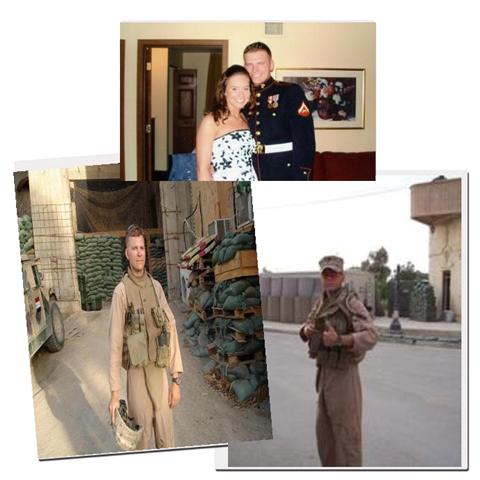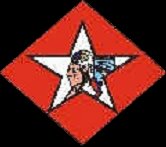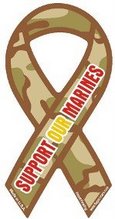Published: April 29, 2007

ON THE JOB TOGETHER Iraqi policemen and American troops patrol near Ramadi in Anbar. Ramadi’s police force has sharply increased in the past year.
RAMADI, Iraq — Anbar Province, long the lawless heartland of the tenacious Sunni Arab resistance, is undergoing a surprising transformation. Violence is ebbing in many areas, shops and schools are reopening, police forces are growing and the insurgency appears to be in retreat.
“Many people are challenging the insurgents,” said the governor of Anbar, Maamoon S. Rahid, though he quickly added, “We know we haven’t eliminated the threat 100 percent.”
Many Sunni tribal leaders, once openly hostile to the American presence, have formed a united front with American and Iraqi government forces against Al Qaeda in Mesopotamia. With the tribal leaders’ encouragement, thousands of local residents have joined the police force. About 10,000 police officers are now in Anbar, up from several thousand a year ago. During the same period, the police force here in Ramadi, the provincial capital, has grown from fewer than 200 to about 4,500, American military officials say.
At the same time, American and Iraqi forces have been conducting sweeps of insurgent strongholds, particularly in and around Ramadi, leaving behind a network of police stations and military garrisons, a strategy that is also being used in Baghdad, Iraq’s capital, as part of its new security plan.
Yet for all the indications of a heartening turnaround in Anbar, the situation, as it appeared during more than a week spent with American troops in Ramadi and Falluja in early April, is at best uneasy and fragile.
Municipal services remain a wreck; local governments, while reviving, are still barely functioning; and years of fighting have damaged much of Ramadi.
The insurgency in Anbar — a mix of Islamic militants, former Baathists and recalcitrant tribesmen — still thrives among the province’s overwhelmingly Sunni population, killing American and Iraqi security forces and civilians alike. [This was underscored by three suicide car-bomb attacks in Ramadi on April 23 and 24, in which at least 15 people were killed and 47 were wounded, American officials said.]
Furthermore, some American officials readily acknowledge that they have entered an uncertain marriage of convenience with the tribes, some of whom were themselves involved in the insurgency, to one extent or another. American officials are also negotiating with elements of the 1920 Revolution Brigades, a leading insurgent group in Anbar, to join their fight against Al Qaeda.
These sudden changes have raised questions about the ultimate loyalties of the United States’ new allies. “One day they’re laying I.E.D.’s, the next they’re police collecting a pay check,” said Lt. Thomas R. Mackesy, an adviser to an Iraqi Army unit in Juwayba, east of Ramadi, referring to improvised explosive devices.
And it remains unclear whether any of the gains in Anbar will transfer to other troubled areas of Iraq — like Baghdad, Diyala Province, Mosul and Kirkuk, where violence rages and the ethnic and sectarian landscape is far more complicated.
Still, the progress has inspired an optimism in the American command that, among some officials, borders on giddiness. It comes after years of fruitless efforts to drive a wedge between moderate resistance fighters and those, like Al Qaeda in Mesopotamia, who seem beyond compromise.
“There are some people who would say we’ve won the war out here,” said Col. John. A. Koenig, a planning officer for the Marines who oversees governing and economic development issues in Anbar. “I’m cautiously optimistic as we’re going forward.”
A New Calm
For most of the past few years, the Government Center in downtown Ramadi, the seat of the provincial government, was under near-continual siege by insurgents, who reduced it to little more than a bullet-ridden bunker of broken concrete, sandbags and trapped marines. Entering meant sprinting from an armored vehicle to the front door of the building to evade snipers’ bullets.
Now, however, the compound and nearby buildings are being renovated to create offices for the provincial administration, council and governor. Hotels are being built next door for the waves of visitors the government expects once it is back in business.
On the roof of the main building, Capt. Jason Arthaud, commander of Company B, First Battalion, Sixth Marines, said the building had taken no sniper fire since November. “Just hours of peace and quiet,” he deadpanned. “And boredom.”
Violence has fallen swiftly throughout Ramadi and its sprawling rural environs, residents and American and Iraqi officials said. Last summer, the American military recorded as many as 25 violent acts a day in the Ramadi region, ranging from shootings and kidnappings to roadside bombs and suicide attacks. In the past several weeks, the average has dropped to four acts of violence a day, American military officials said.
On a recent morning, American and Iraqi troops, accompanied by several police officers, went on a foot patrol through a market in the Malaab neighborhood of Ramadi. Only a couple of months ago, American and Iraqi forces would enter the area only in armored vehicles. People stopped and stared. The sight of police and military forces in the area, particularly on foot, was still novel.
The new calm is eerie and unsettling, particularly for anyone who knew the city even several months ago.
“The complete change from night to day gives me pause,” said Capt. Brice Cooper, 26, executive officer of Company B, First Battalion, 26th Infantry Regiment, First Infantry Division, which has been stationed in the city and its outskirts since last summer. “A month and a half ago we were getting shot up. Now we’re doing civil affairs work.”
A Moderate Front
The turnabout began last September, when a federation of tribes in the Ramadi area came together as the Anbar Salvation Council to oppose the fundamentalist militants of Al Qaeda in Mesopotamia.
Among the council’s founders were members of the Abu Ali Jassem tribe, based in a rural area of northern Ramadi. The tribe’s leader, Sheik Tahir Sabbar Badawie, said in a recent interview that members of his tribe had fought in the insurgency that kept the Americans pinned down on their bases in Anbar for most of the last four years.
“If your country was occupied by Iraq, would you fight?” he asked, smiling knowingly. “Enough said.”
But while the anti-American sheiks in Anbar and Al Qaeda both opposed the Americans, their goals were different. The sheiks were part of a relatively moderate front that sought to drive the Americans out of Iraq; some were also fighting to restore Sunni Arab power. But Al Qaeda wanted to go even further and impose a fundamentalist Islamic state in Anbar, a plan that many of the sheiks did not share.
Al Qaeda’s fighters began to use killing, intimidation and financial coercion to divide the tribes and win support for their agenda. They killed about 210 people in the Abu Ali Jassem tribe alone and kidnapped others, demanding ransoms as high as $65,000 per person, Sheik Badawie said.
For all the sheiks’ hostility toward the Americans, they realized that they had a bigger enemy, or at least one that needed to be fought first, as a matter of survival.
The council sought financial and military support from the Iraqi and American governments. In return the sheiks volunteered hundreds of tribesmen for duty as police officers and agreed to allow the construction of joint American-Iraqi police and military outposts throughout their tribal territories.
A similar dynamic is playing out elsewhere in Anbar, a desert region the size of New York State that stretches west of Baghdad to the Syrian and Jordanian borders. Tribal cooperation with the American and Iraqi commands has led to expanded police forces in the cities of Husayba, Hit, Rutba, Baghdadi and Falluja, officials say.
With the help of the Anbar sheiks, the military equation immediately became simpler for the Americans in Ramadi. The number of enemies they faced suddenly diminished, American and Iraqi officials said. They were able to move more freely through large areas. With the addition of the tribal recruits, the Americans had enough troops to build and operate garrisons in areas they cleared, many of which had never seen any government security presence before.
And the Americans were now fighting alongside people with a deep knowledge of the local population and terrain, and with a sense of duty, vengeance and righteousness.
“We know this area, we know the best way to talk to the people and get information from them,” said Capt. Hussein Abd Nusaif, a police commander in a neighborhood in western Ramadi, who carries a Kalashnikov with an Al Capone-style “snail drum” magazine. “We are not afraid of Al Qaeda. We will fight them anywhere and anytime.”
Beginning last summer and continuing through March, the American-led joint forces pressed into the city, block by block, and swept the farmlands on the city’s outskirts. In many places the troops met fierce resistance. Scores of American and Iraqi security troops were killed or wounded.
The Ramadi region is essentially a police state now, with some 6,000 American troops, 4,000 Iraqi soldiers, 4,500 Iraqi police officers and an auxiliary police force of 2,000, all local tribesmen, known as the Provincial Security Force. The security forces are garrisoned in more than 65 police stations, military bases and joint American-Iraqi combat outposts, up from no more than 10 a year ago. The population of the city is officially about 400,000, though the current number appears to be much lower.
To help control the flow of traffic and forestall attacks, the American military has installed an elaborate system of barricades and checkpoints. In some of the enclaves created by this system, which American commanders frequently call “gated communities,” no vehicles except bicycles and pushcarts are allowed for fear of car bombs.
American commanders see the progress in Anbar as a bellwether for the rest of country. “One of the things I worry about in Baghdad is we won’t have the time to do the same kind of thing,” Lt. Gen. Raymond T. Odierno, commander of day-to-day war operations in Iraq, said in an interview here.
Yet the fact that Anbar is almost entirely Sunni and not riven by the same sectarian feuds as other violent places, like Baghdad and Diyala Province, has helped to establish order. Elsewhere, security forces are largely Shiite and are perceived by many Sunnis as part of the problem. In Anbar, however, the new police force reflects the homogeneous face of the province and, most critically, appears to enjoy the support of the vast majority of the people.
A Growing Police Force
Military commanders say they cannot completely account for the whereabouts of the insurgency. They say they believe that many guerrillas have been killed, while others have gone underground, laid down their arms or migrated to other parts of Anbar, particularly the corridor between Ramadi and Falluja, the town of Karma north of Falluja and the sprawling rural zones around Falluja, including Zaidon and Amariyat al-Falluja on the banks of the Euphrates River. American forces come under attack in these areas every day.
Still other guerrillas, the commanders acknowledge, have joined the police force, sneaking through a vetting procedure that is set up to catch only known suspects. Many insurgents “are fighting for a different side now,” said Brig. Gen. Mark Gurganus, commander of ground forces in Anbar. “I think that’s where the majority have gone.”
But American commanders say they are not particularly worried about infiltrators among the new recruits. Many of the former insurgents now in the police, they say, were probably low-level operatives who were mainly in it for the money and did relatively menial tasks, like planting roadside bombs.
The speed of the buildup has led to other problems. Hiring has outpaced the building of police academies, meaning that many new officers have been deployed with little or no training. Without enough uniforms, many new officers patrol in civilian clothes, some with their heads wrapped in scarves or covered in balaclavas to conceal their identities. They look no different than the insurgents shown in mujahedeen videos.
Commanders seem to regard these issues as a necessary cost of quickly building a police force in a political environment that is, in the words of Colonel Koenig, “sort of like looking through smoke.” The police force, they say, has been the most critical component of the new security plan in Anbar Province and the key to sustaining the military successes.
Yet, oversight of the police forces by American forces and the central Iraqi government is weak, leaving open the possibility that some local leaders are using newly armed tribal members as their personal death squads to settle old scores.
Several American officers who work with the Iraqi police said a lot of police work was conducted out of their view, particularly at night. “It’s like the Mafia,” one American soldier at an outpost in Juwayba said.
General Odierno said, “We have to watch them very closely to make sure we’re not forming militias.”
But there is a new sense of commitment by the police, American and Iraqi officials say, in part because they are patrolling their own neighborhoods. Many were motivated to join after they or their communities were attacked by Al Qaeda, and their successes have made them an even greater target of insurgent car bombs and suicide attacks.
Abd Muhammad Khalaf, 28, a policeman in the Jazeera district on Ramadi’s northern edge, is typical. He joined the police after Al Qaeda in Mesopotamia killed two of his brothers, he said. “I will die when God wills it,” he said. “But before I die, I will support my friends and kill some terrorists.”
The Tasks Ahead
Some tribal leaders now working with the Americans say they harbor deep resentment toward the Shiite-led administration of Prime Minister Nuri Kamal al-Maliki, accusing it of pursuing a sectarian agenda. Yet they also say they are invested in the democratic process now.
After boycotting the national elections in 2005, many are now planning to participate in the next round of provincial elections, which have yet to be scheduled, as a way to build on the political and military gains they have made in recent months.
“Since I was a little boy, I have seen nothing but warfare — against the Kurds, Iranians, Kuwait, the Americans,” Sheik Badawie, the tribal leader, said. “We are tired of war. We are going to fight through the ballot box.”
Already, tribal leaders are participating in local councils that have been formed recently throughout the Ramadi area under the guidance of the American military.
Iraqi and American officials say the sheiks’ embrace of representative government reflects the new realities of power in Anbar. “Out here it’s been, ‘Who can defend his people?’ ” said Brig. Gen. John R. Allen, deputy commanding general of coalition forces in Anbar. “After the war it’s, ‘Who was able to reconstruct?’ ”
Indeed, American and Iraqi officials say that to hold on to the security gains and the public’s support, they must provide services to residents in areas they have tamed.
But successful development, they argue, will depend on closing the divide between the Shiite-dominated government in Baghdad, which has long ignored the province, and the local leadership in Anbar, which has long tried to remain independent from the capital. If that fails, they say, the Iraqi and American governments may have helped to organize and arm a potent enemy.
Uneasy Alliance Is Taming One Insurgent Bastion








